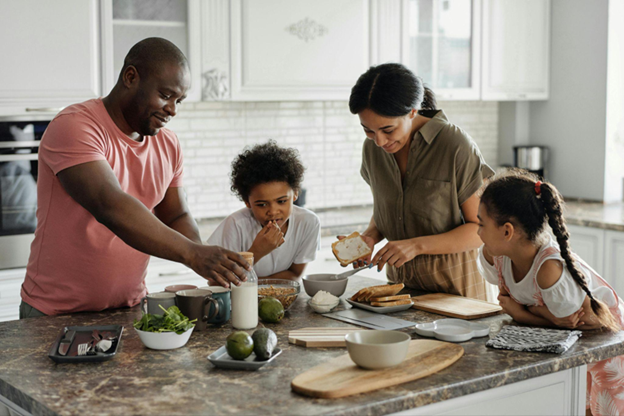
Written by Janice Russell
Founder of ParentingDisasters.com — surviving one tantrum at a time.
Everyday life with children is built around countless small moments—morning routines, messy meals, laughter echoing from another room. Within these rhythms lies a powerful influence: the example parents set, quietly guiding their kids toward the choices they’ll carry for the rest of their lives. To raise children who live well—physically, emotionally, and socially—parents must shape an environment where wellness feels natural, rewarding, and rooted in joy rather than restriction.
Modeling the Life You Want Them to Live
The first teacher in a child’s life doesn’t hold a degree in education. They hold car keys, cook dinner, and sigh audibly when they’re tired. Children watch what their parents eat, how they handle stress, how often they move their bodies, and how they talk to others—especially when no one is supposed to be listening. Healthy habits modeled at home become the blueprint kids turn to, consciously or not, as they grow older and face choices on their own. Parents who consistently prioritize things like sleep, vegetables, or a walk around the block are offering more than routines—they’re offering permission to prioritize well-being without apology.
Dreams Don’t Expire—They Evolve
Children learn just as much from watching their parents chase their goals as they do from hearing encouragement about their own. It’s never too early to ask them what excites them about the future, and to show what following a dream looks like in real life. If you've been putting off finishing your degree, now is a meaningful time to consider options like an information technology bachelor of science, or even degrees in business administration, education, or healthcare management. When you make room for growth in your own life, your kids see firsthand that pursuing passions doesn’t have an expiration date—it just takes intention.
Let Curiosity Lead the Way
Trying to enforce health from a rulebook rarely sticks, especially with kids who are wired to ask questions and challenge boundaries. But when parents frame choices around curiosity, children feel more like explorers than followers. Instead of “you have to eat this,” the invitation becomes, “Let’s find out how many colors we can eat today,” or “I wonder what happens to your energy after this snack versus that one.” Guiding kids to tune into how different foods, activities, and sleep patterns make them feel equips them with self-awareness that can outlast the usual charts and rules. Health becomes personal—not performative.
Play Is the Classroom
There’s no better place to introduce physical activity and mental resilience than during play. Children process the world through movement and imagination, and when parents join in that process, the benefits are lasting and layered. Climbing, running, building, pretending—these aren’t just distractions from "real" learning; they are learning. And tools that encourage that kind of playfulness become powerful allies. Upper Notch Club offers play essentials that fit this purpose beautifully: a sand and water table that turns backyard afternoons into tactile science labs, a play mat for babies and toddlers that lays the groundwork for safe exploration, and even a kitchen tablecloth that transforms mealtime into a whimsical playhouse adventure. These aren’t just toys—they're invitations to connect, laugh, and move together.
Sleep, Screens, and the Unseen Choices
Health isn’t always built on what kids do—sometimes it’s what they don’t. Overscheduling, overstimulation, and poor sleep can all chip away at the resilience children need to navigate life well. Parents who set thoughtful boundaries around screen time, create bedtime rituals that soothe rather than scold, and carve out pockets of boredom where imagination can bloom are quietly constructing guardrails that protect mental and emotional wellness. These aren’t glamorous decisions, but they’re the kind that accumulate over years to make life more livable.
The Value of Slowing Down Together
In an age where even family time can feel like another item on a to-do list, it helps to remember that simply being present is a radical act. Children don’t require grand adventures or expensive memberships to build strong bonds or healthy habits. A picnic on the living room floor, a slow walk after dinner, or co-creating a fantastical world out of a sand and water table—these are the moments that linger. When parents choose to engage, even just for a few minutes with intention, they send a message louder than any lecture: "You matter. This time matters." That security becomes the soil where lifelong confidence and self-care take root.
Parenting doesn’t come with a manual, but it does come with moments—thousands of them. Each one is a chance to shape the tone and texture of the life a child is building. Lifelong health doesn’t emerge from a single decision, but from an atmosphere—one filled with connection, curiosity, boundaries, and joy. With the right tools, parents can build a life where health isn’t a destination, but a way of being that begins at home.
Discover unique gifts and essentials for every occasion at Upper Notch Club and enjoy exclusive access to sales and new product launches by joining their VIP club today!
